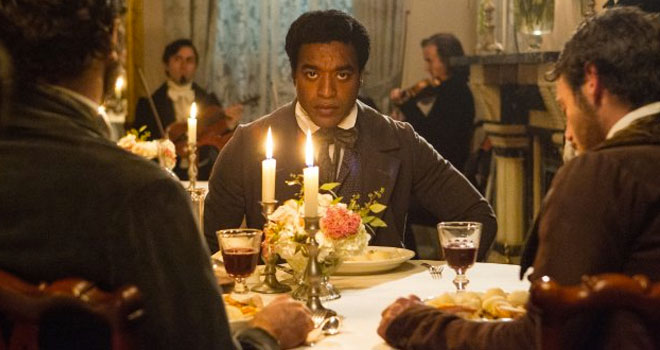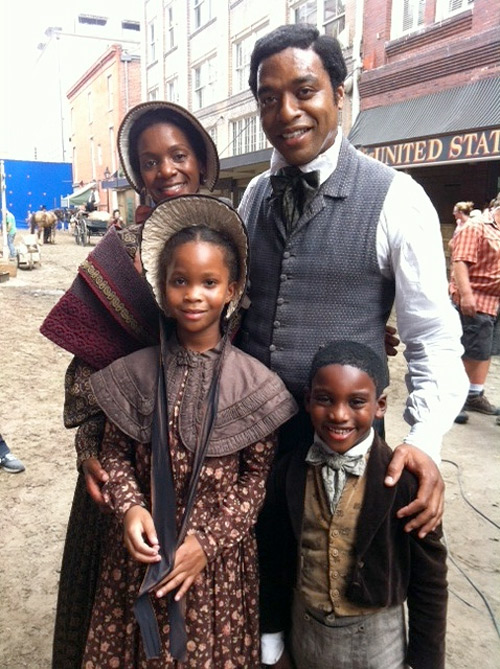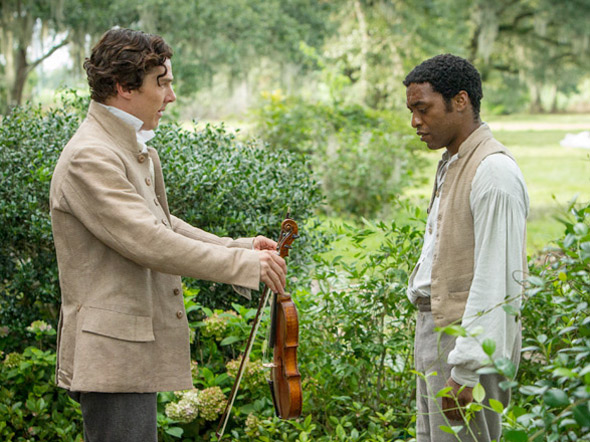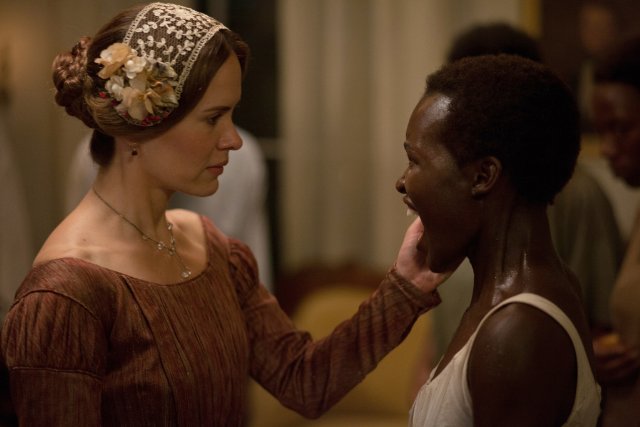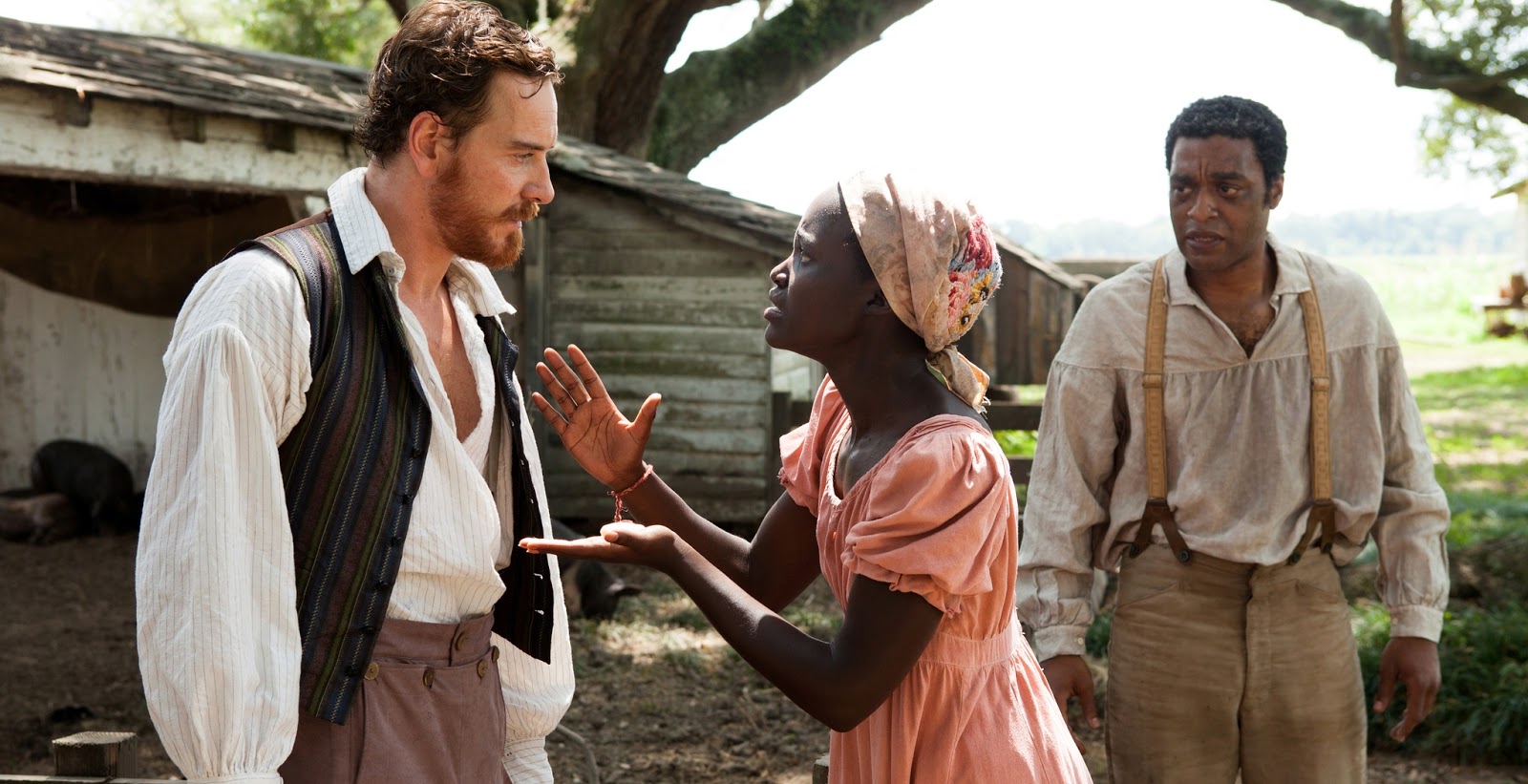“Every part of your story is amazing, and none of it in the good way.”
Paraphrasing executive producer Brad Pitt’s endearing Canadian Abolitionist’s reaction to Solomon Northrup (Chiewetel Ejiofor,) the titular slave’s tale could also easily sum up this film. 12 Years A Slave is an incredible film that fully immerses you in the decade plus the film’s protagonist spent enslaved on numerous plantations. The film, directed by Hunger and Shame‘s Steve McQueen does an amazing job of forcing the viewer to inhabit a cinematic simulacrum of the harrowing experiences suffered by countless men and women during this dark time in history.
In that regard, the overwhelmingly positive critical reception the film has garnered smacks of insincerity, just another sad movie about the trials and tribulations of brown people for the more fortunate to rub on their skins like a self satisfied salve, an escape into the tragedies of the past to distract from the First World Problems of the present.
I refuse to fault the filmmakers for this, as nothing in the movie has the sentimental, “feel bad for recreational reasons” tone that so many other Oscar bait films go out of their way to cultivate. One can count on a hand and a half the number of narratives about slavery presented on the big screen in the last few decades, so it’s not shocking for people to be bowled over by a film like 12 Years… given the paucity of equivalent alternatives, but, Armond White’s contrarian opinion aside, this really is one of the best films I have seen all year.
12 Years… tells the true story of Solomon Northrup, a freeman living in New York in 1841 who is conned, kidnapped, and sold into slavery in Washington, DC. The film has an episodic structure, as we follow Northrup from plantation to plantation, but not an episodic pace, which is fascinating and impressive. A friend of mine just read the book the Northrup wrote that serves as the basis for this film, and it’s clear to me from discussions with him that the screenwriter here (Three Kings and Undercover Brother‘s John Ridley) got really lucky in terms of narrative inspiration. It’s a true story that luckily lends itself to cinematic structure. None of the scenes feel extraneous, and even though there is not as clear a three act structure as Robert McKee might hope for, each incident moves forward in a thematic progression that rings true.
Based on pedigree alone, this movie has been hotly anticipated since it’s inception, but I think the birthplace of the wave of backlash currently set against it was the premiere of the first theatrical trailer. Everything about that initial preview painted this as the kind of sickeningly manipulative prestige picture that comes along every fall, a knotty bundle of extravagant emotions, swelling soundtrack strings, wet-cheeked performances and soft focus cinematography. This could not be the work of the same man who made us all cry during a Michael Fassbender threesome in the climax of Shame. Surely, he, too, couldn’t have fallen to such negligent storytelling.
Alas, from the very first frame, we are watching a Steve McQueen film. The long takes, the uncomfortably staid medium shots that force us to sit with his protagonists and to search their faces for all manner of pain. McQueen starts us out at a seemingly random moment in Northrup’s tenure as a slave, then flashes back to his life as a free man, teasing us into his eventual capture with the assured hand of a horror director. The moment Northrup wakes up in chains is played straight, but the effect it has is more effective than any of the torture porn thrillers the film’s biggest detractors have compared it to. The disgusting realities of life during slavery are shown very plainly, unadorned of any sensationalist enhancement, a sobering technique that lulls the viewer into a false sense of security so that when something truly gruesome or deplorable is shown, the shock of it still hits you in the gut.
With the exception of Brad Pitt’s nearly laughable turn as the film’s real life deus ex machina, with his questionable facial hair and frustratingly simple acting choice of speaking with a deliberate, raspy, yet cordial voice that wouldn’t be out of place at an Arby’s drive-thru, this is the most well acted film of 2013, hands down. Chiewetel Ejiofor might finally get an Oscar, something that would please me immensely, as he’s probably been my favorite working actor since 2004’s Dirty Pretty Things. He delivers an engrossing, humbling performance as a proud, intelligent and loving man brought to his knees by a corrupt system and some devastating circumstances. He has no dialogue for large swaths of screen time, and gets so much across using only body language and the disgruntled manipulation of his visage.
Benedict Cumberbatch and Michael Fassbender present diametrically opposed portrayals of the slave owner. Cumberbatch imbues his William Ford, a soft man with a weak stomach for punishment and a reserved disgust for the slave trade, with a false sense of honor, as though wincing at the abuse of slaves somehow absolves one from owning a human being as property. In his earliest scenes, he is contrasted against the matter of fact slave merchant Paul Giamatti inhabits as a man of business who doesn’t have time for moral grandstanding. It’s Michael Fassbender’s Edwin Epps, a self-professed “nigger breaker” with a penchant for meting out violence, who presents one of the most electric, layered performances. Scenes of him drunkenly forcing his slaves to dance through a mock ball in the middle of the night for his amusement are so macabre and disturbing, but nowhere near as disheartening as his affection for Patsy, the slave girl of his eye who picks 500lbs of cotton a day, a feat he praises with an disgusting adoration at once fatherly and romantic.
Lupita N’Yongo, who plays Patsy, the film’s sacrificial lamb, is the breakout performance of the film. The way the film treats her illuminates one of its biggest strengths. It’d be easy for a movie about slavery to draw simple dividing lines between black and white, but this film fills in all of the social structure’s subdivisions, between man and woman, light and dark, subservient and radical. Patsy draws considerable ire from Epps’ wife, played with congenial derision by Sarah Paulson. Her abuse and hatred comes from a very different place than what we see from the film’s other antagonists, and we see, that as much power as she holds over Patsy, she is still lower than her husband. The horrors Northrup himself experience are nothing compared to the physical and emotional torment visited upon Patsy. When it comes to the power plays and limits of control in 12 Years…, as Meek Mill might say, “there’s levels to this shit.”
As the film moves forward, we are presented with multiple moments where an audience who has just seen Django Unchained might expect some small victory, some sliver of cinematic revenge, only to be punished for such hope with firm reminders of the realities of this time period. We see Northrup, on a routine shopping trip for Mrs. Epps, alone in the woods. He stops walking, and the camera rests on him, as if to say, “don’t do it. Don’t…” before he takes off in a sprint, ready to run away. We chase him through the trees until he comes to a clearing where three slaves are strung up, ready to be hung. In another scene of near wish fulfillment, Northrup takes some aggression out on Paul Dano’s insolent, punchable carpenter, a moment the audience in my theater applauded. For their trouble, they’re rewarded with a five minute sequence of Northrup, tied up in a noose on his tip toes in the mud, one slip away from having the life extinguished from him. There is no escape here. Even the film’s eventual denoument is stained with sadness. There’s no celebration, even in the hollow victory of freedom. That’s slavery.
The long takes and close proximity of the camera allows for very theatrical staging, as if a hidden proscenium arch presides over the story. Moments in another film that might lead a courageous hero to erupt into action occur here, only the camera sullenly lingers on our protagonist, quietly reminding us of our place. The composition of the film’s climatic whipping scene is some of the finest filmmaking I have seen in a very long time. It is legitimately difficult to keep your eyes open for, as McQueen’s camera moves around the proceedings, lulling us into the false sense of security that we won’t have to clearly see the tapestry of pain on the victim’s spine, a lie that becomes a smoldering wound when we’re forced to fix our gaze on the result of the most physical lashing since Mel Gibson killed Jesus.
That is this film. It’s an exhausting journey through one man’s experiences being denied his humanity, a decade living as property. There’s no lesson to be learned. If you need a movie to tell you that slavery is wrong, well, this movie isn’t for you. No movie is. This isn’t for you to feel good that you never had to have it so bad. It’s for you to watch, to look, to see. Watch as a free man is stripped of everything he holds dear and everything that makes him who he is, and then watch as he regains that freedom. Yes, he’s no longer a slave, but as history tell us, Solomon Northrup tasted no vengeance. His captors walked free. There was no payback for what he suffered. At a few different points in the film, someone utters a variation of the thought that there will come a great reckoning, and all those foolhardy enough to think they could own human beings would get their comeuppance. This film offers no such vindication. Neither has history. Hearing such a sentimental thought spoken by Brad Pitt in a film so otherwise devoid of sentiment is the funniest, saddest piece of dialogue in cinema this year.
12 Years A Slave opens in limited release today.


